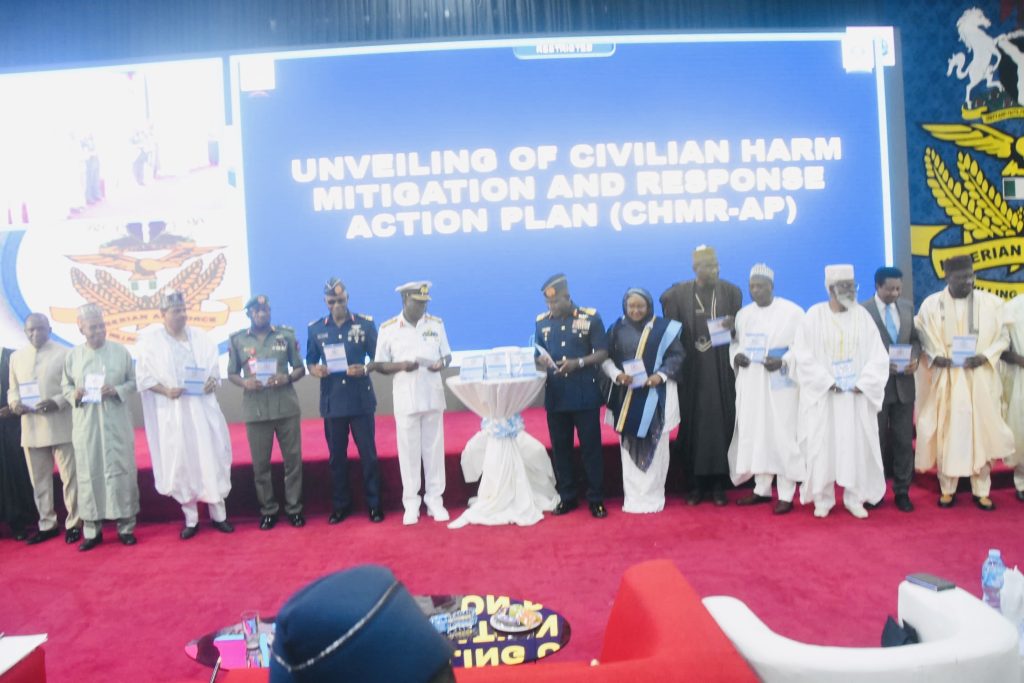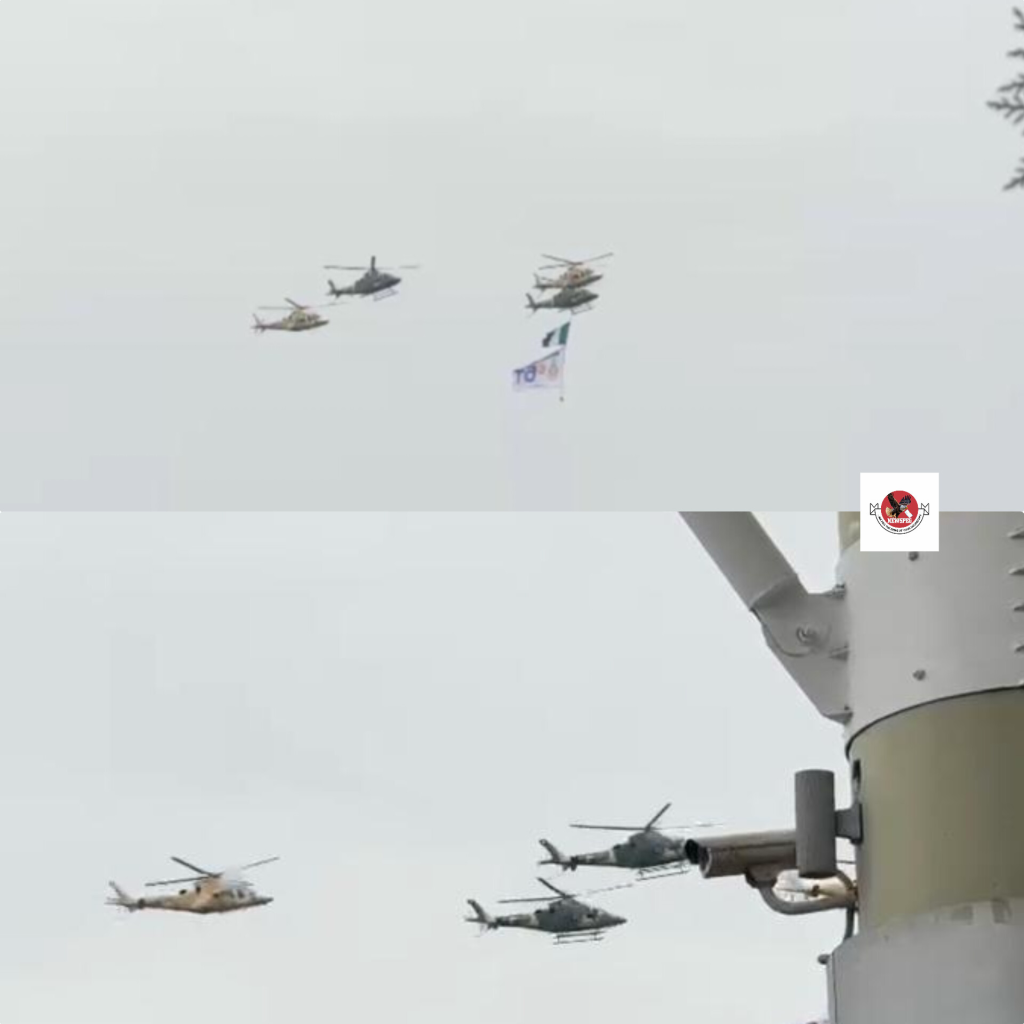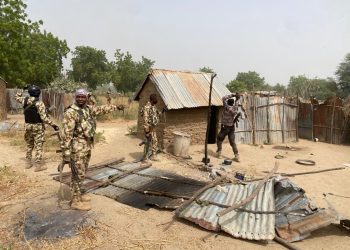…as CAS reiterates Public trust is not a luxury, it’s a battlefield asset we cannot afford to lose
By Nkechi Eze
The Nigerian Air Force (NAF), on Tuesday, May 20, 2025, hosted a high-level seminar in Abuja as part of its 61st Anniversary celebrations, unveiling a comprehensive Civilian Harm Mitigation and Response Action Plan (CHMRAP) aimed at strengthening accountability and civilian protection in air operations. Themed “Optimizing Civil-Military Relations in a Joint Operational Environment for Enhanced Air Operations,” the seminar spotlighted the imperative of mutual trust, dialogue, and cooperation between the armed forces and civilian stakeholders in Nigeria’s evolving security landscape.
Declaring the seminar open, the Chief of the Air Staff (CAS), Air Marshal Hasan Bala Abubakar, delivered an extensive keynote in which he reaffirmed the Nigerian Air Force’s commitment to constitutional duty, democratic governance, and the protection of civilian lives.
“This seminar is not merely ceremonial. It is a flagship component of our anniversary, a platform for critical reflection, and a symbol of our enduring commitment to engage with the society we are sworn to defend.” He said.
Air Marshal Abubakar emphasized that the seminar’s theme was carefully chosen to reflect NAF’s institutional values. “At the heart of this year’s theme lies our recognition that the citizenry is not a passive observer in our security architecture, but our most valued partner in the quest to secure our nation,” he stated.

“As an Air Force, we are deeply conscious that military effectiveness is incomplete without public trust, community collaboration, and adherence to the highest standards of accountability.
Addressing civil-military relations, the Air Chief reiterated that the Nigerian Air Force has consistently operated with a clear apolitical stance, guided by the Constitution, the rule of law, and the principles of human rights.
“The Nigerian Air Force has remained firmly apolitical and committed to democratic ideals. Our allegiance is to the Constitution and to the Nigerian people. We have consistently upheld the values of professionalism, transparency, and accountability in all our operations,” he declared.
Reflecting on past engagements, Air Marshal Abubakar recounted the Air Force’s contributions to national humanitarian efforts, including disaster relief operations, medical outreaches, and the dignified repatriation of Nigerians from conflict zones abroad. He recalled the pivotal role played by NAF during the Ebola and COVID-19 outbreaks, where personnel placed themselves at great personal risk to support national response efforts in coordination with agencies such as the NCDC and NEMA.
“We have stood shoulder-to-shoulder with the Nigerian people in moments of crisis. Whether in delivering critical supplies to remote locations or airlifting stranded citizens home, the Nigerian Air Force has been a reliable national asset,” he said.
The CAS also noted that the NAF has, through its educational institutions like the Air Force Institute of Technology and its extensive network of schools, fostered civil-military trust while contributing to national development. “Our schools are not just for the children of servicemen and women they are open to the wider society. This is part of our philosophy of inclusiveness and nation-building,” he explained.
Turning to operational matters, Air Marshal Abubakar highlighted NAF’s precision-based approach to warfare and its globally commendable record in minimizing civilian casualties. “Since 2015, despite conducting thousands of air sorties across diverse conflict theatres, the Nigerian Air Force has recorded fewer than a handful of incidents involving civilian casualties. Our rate of occurrence stands at less than 0.005%, which, by all international standards, is exceptional,” he declared.
However, he acknowledged the inherent challenges in modern conflict, especially when adversaries deliberately embed within civilian populations. “We are operating in an asymmetric environment where the enemy has no rules, no boundaries, and no regard for civilian life. In such a context, we must constantly innovate, refine our procedures, and hold ourselves to higher standards.”
Air Marshal Abubakar announced that the NAF had institutionalized several safeguards, including advanced surveillance platforms, enhanced mission-abort protocols, and continuous training in the laws of armed conflict and the rules of engagement. He also disclosed the recent elevation of the Directorate of Civil-Military Relations to a branch-level structure, a move he described as “a strategic reinforcement of our non-kinetic operations and civil engagement posture.”
“In our engagements, we are guided by transparency, compassion, and national interest,” he said. “The launch of the Civilian Harm Mitigation and Response Action Plan today is not just an administrative milestone. It is a moral and operational imperative.”
He emphasized that the CHMR-AP was developed in alignment with Articles 51 and 57 of Protocol I of the Geneva Conventions, with input from national and international stakeholders including the United States Government, the Institute for Security Governance, and the Center for Naval Analyses.
In a detailed briefing, Air Vice Marshal Daramola outlined the plan’s key elements, including the establishment of a Civilian Harm Mitigation and Response Board, a Civilian Harm Assessment and Investigation Cell, and a dedicated Department for Civilian Harm Mitigation at the Air Warfare and Doctrine Centre. The plan also mandates the integration of civilian protection strategies into operational planning, doctrine, training, and targeting practices.
“It is a flexible and forward-looking plan that enhances the service’s ability to mitigate harm and achieve strategic success across the full spectrum of conflict,” he said.
Delivering the keynote address on behalf of the Guest of Honour, the Executive Governor of Borno State, Professor Babagana Umara Zulum, was Professor Prof. Usman Tar, a defence expert. Professor Tar noted the governor’s absence due to urgent field visits to insurgency-affected areas in Borno State.
Speaking on behalf of the governor, Professor Tar praised the Nigerian Air Force for its unwavering role in counterterrorism, particularly in the northeast. “Our airspace is virtually out of bounds for insurgents and terrorists, a testament to the effectiveness of air power in national defence,” the governor said.
Governor Zulum commended the NAF for acquiring modern platforms and for its strategic partnerships, while also warning about emerging threats such as terrorist acquisition of drone technologies. “It is sadly alarming to hear recent reports of terrorists acquiring drone capability with the potential to deliver projectiles. We must respond proactively to this evolving threat,” he cautioned.
He also emphasized the need for stronger civil-military trust, intelligence-sharing, and community ownership in conflict resolution. “Unfortunately, civil-military interaction has sometimes been marred by mistrust and acrimony. This must be addressed,” he stressed.
Acknowledging recent incidents involving unintended civilian harm, the governor said: “While such occurrences are deeply regrettable, we understand the complexities of air operations in fluid conflict zones. The Nigerian Air Force’s willingness to openly address these issues is both commendable and reassuring.”
The governor concluded by praising the NAF for organizing the seminar and creating a platform for open dialogue. “The fact that the Nigerian Air Force is prepared to talk about these issues underscores the importance of trust, cooperation, and shared responsibility in civil-military relations,” he said.
The seminar featured additional expert presentations, including one by Professor Chris Garuba Zabadi, who addressed the importance of building trust in civil-military relations as a cornerstone of effective joint operations.
In his closing remarks, Air Marshal Abubakar reaffirmed that securing the nation requires the collective effort of all stakeholders. “The synergy between the military and civilian stakeholders remains central to achieving our collective aspirations for a secure and prosperous Nigeria,” he declared.
With the CHMRAP now officially launched, the Nigerian Air Force has not only deepened its institutional reforms but also reaffirmed its moral compass positioning civilian protection not just as a principle, but as a defining pillar of national defence.


Highlight of the event was the presentation of cheques to beneficiaries of NAF group personal accident insurance policy (GPAIP), NAF ORBAT fly past and presentation of souvenirs.













